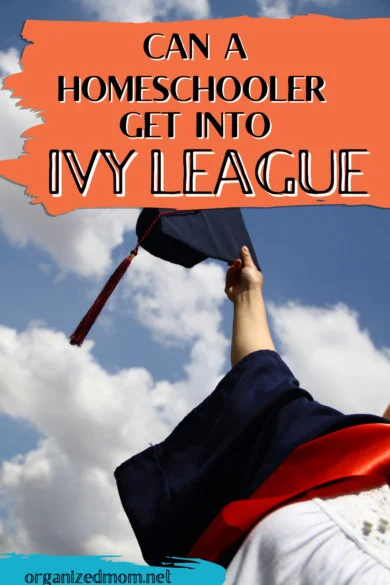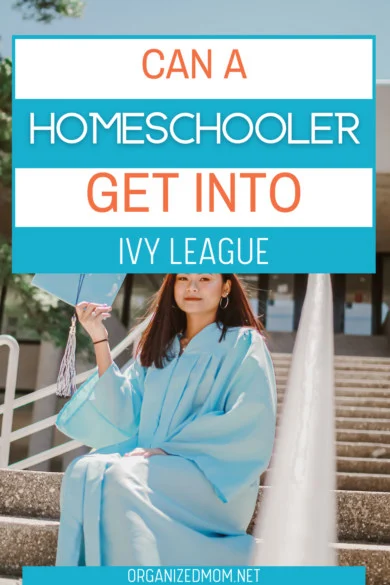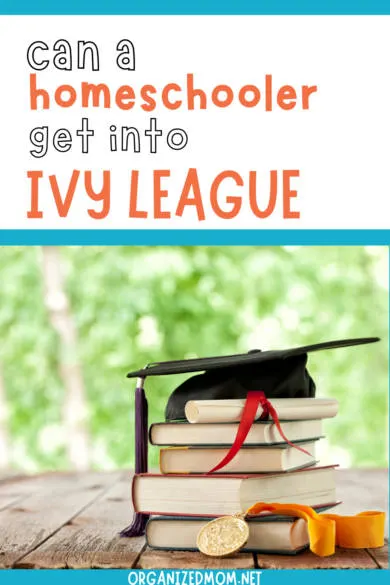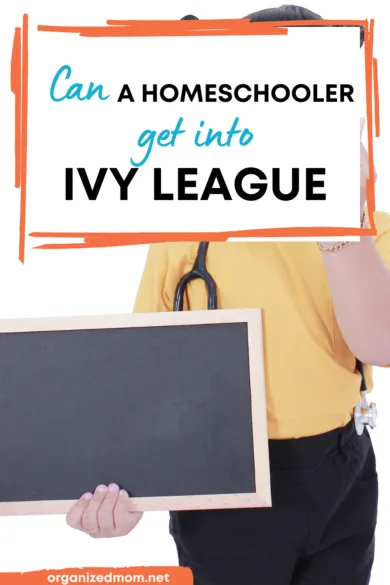Homeschooling has become a popular alternative educational choice for many families. Proponents of homeschooling cite the many benefits, but some detractors staunchly oppose homeschooling. They feel that it is an inferior education, limiting the child’s opportunities, such as the chance of attending an Ivy League College. What is the truth – can homeschoolers get into Ivy League?
Homeschoolers can get into Ivy League if they meet the institute’s criteria. Ivy League Colleges have high entrance requirements, and any student must meet these before they are considered. Homeschoolers should document their curriculum and activities, getting proof and referral letters.
Gaining entrance to Ivy League is often considered the pinnacle of educational success. Parents considering homeschooling may want to know if their child can get accepted into an Ivy League College.

Do Ivy League Colleges Accept Homeschoolers?
Most people would tell you that to be accepted to an Ivy League College or University, you need to attend a prestigious school and excel in all the traditional school milestones. They would be almost certain homeschoolers would not be accepted.
This viewpoint is erroneous and untrue. Ivy League Colleges accept homeschoolers. They are becoming more eager to do so following records showing the success of homeschoolers at Ivy League Colleges and Universities.
The Harvard News recently published an article detailing the successes of three Harvard students who were homeschooled.
The Wall Street Journal reported on a study by two Harvard researchers, B. Chase and Y. Chen. They found that homeschoolers were less likely to suffer from depression, abuse substances, or commit suicide. They also more often volunteer for programs and can overcome upsetting conflicts using forgiveness.
Ivy League Colleges have taken note of these trends and are looking favorably on college applications by homeschoolers. Chen noted in a follow-up interview that Ivy League and other top-rated Universities and Colleges are altering their application processes to accommodate homeschoolers.
Is It Hard For Homeschoolers To Get Into Ivy League
Ivy League Colleges and Universities have stringent acceptance criteria making it difficult for all applicants. Each university or college has its own criteria, with some accepting as little as 3.8% of all applicants.
Most applicants to Ivy League Institutions have high academic results, and the majority of them are still not accepted. Acceptance criteria include:
- Students who have shown a love of learning by seeking out additional educational experiences.
- Students that are or have been involved in community or social projects.
- Students that have extracurricular interests, sports, and hobbies.
- Students that have advanced an area they are passionate about through special projects or extra studies.
These criteria apply to homeschoolers and traditionally educated applicants. A salient point for homeschoolers wanting to apply to Ivy League Institutions is that they should start early. They must collect testimonials and certificates from all their activities.
Homeschoolers have an advantage in having a lot more time for extracurricular activities than traditionally schooled students. In some cases, community work and extended studies can form a part of their schooling.
Do You Need GED For Ivy League Colleges?
Each Ivy League Institution differs in its acceptance criteria. Most do not require GED certificates. Some require outside assessments such as SAT, ACT, and AP scores to determine academic ability.
The institutions advise applicants to have detailed documentation of their homeschool curriculum. Many states do not have a prescribed homeschool curriculum, and others have loose guidelines. A comprehensive description of the homeschool curriculum gives the applicant a better chance of being accepted.
The curriculum should be strong in all major disciplines, and some Ivy League Colleges require the applicant to have studied a second language.

Letters Of Recommendation
Many Ivy League Colleges require testimonials or recommendation letters for the students. Normally the letters are supplied by a school’s teachers or life counselors.
These letters can be difficult for homeschoolers to acquire as parents, relatives, and paid tutors do not qualify.
Outside teachers, community leaders, librarians, and cultural or spiritual leaders are suitable people for recommendation letters. It is important that these letters are professional and include the person’s qualifications and the position they hold.
Character is regarded as an essential factor in choosing students for Ivy League. Applicants who have overcome unusual life or home circumstances can get recommendations documenting their perseverance.
Ivy League Want Socialization Evidence For Homeschoolers
Despite the fact that many homeschoolers are more social and interact better with multiple generations, the stigma of an antisocial, maladjusted child persists.
It is critical to have evidence that shows homeschoolers are part of social groups such as church youth groups, Scouts, choirs, etc. Most Ivy League Institutions place a high emphasis on the ability to integrate socially.
Socialization can be a challenge for some homeschoolers that chose this path because of social issues at school. Often children with autism homeschool, which makes the need to give evidence of socialization challenging.
Parents can help by providing alternative socialization opportunities, such as a club that focuses on a field the homeschooler is passionate about. These clubs allow the shy or autistic child to have a natural bond with other members and provide a topic of conversation.
Some shy students may find it easier to communicate with older people or younger children. Volunteering at homes for the elderly, street children outreach, or being a helper at children’s groups may make them more comfortable.
Extension Programs Help Homeschoolers With Ivy League
Some Ivy League Colleges or Universities run extension programs where students can take short courses. These courses usually have no entry requirements and can be done online.
Homeschoolers have the perfect opportunity to complete extension courses that aid their application and may even qualify them for financial assistance.
The Harvard Extension School is an excellent example of this type of program.
Conclusion
Homeschoolers can get into Ivy League, but they must have strong academic achievements accompanied by evidence of extracurricular, social, and community involvement. Ivy League Colleges may be considered the most desirable, but many other excellent educational institutions may suit the homeschooler better. Finding the right college or university ensures the best chance of success.




